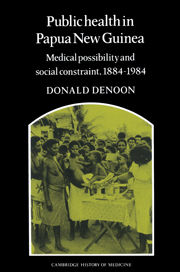Book contents
- Frontmatter
- Contents
- Acknowledgements
- Maps of Papua New Guinea
- Introduction
- I The rise and fall of tropical medicine
- II The rise and fall of the great campaigns
- 8 Miracle drugs, new perceptions and the post-war Public Health Department
- 9 The health campaigns
- 10 Women and children last
- 11 Health education
- 12 A national health system
- 13 Primary health care
- 14 The past and the future
- Notes
- Bibliography
- Index
11 - Health education
Published online by Cambridge University Press: 11 February 2010
- Frontmatter
- Contents
- Acknowledgements
- Maps of Papua New Guinea
- Introduction
- I The rise and fall of tropical medicine
- II The rise and fall of the great campaigns
- 8 Miracle drugs, new perceptions and the post-war Public Health Department
- 9 The health campaigns
- 10 Women and children last
- 11 Health education
- 12 A national health system
- 13 Primary health care
- 14 The past and the future
- Notes
- Bibliography
- Index
Summary
The public health programme was centralised, technically sophisticated, highly professional, imbued with a sense of urgency, and armed with the most modern drugs. The mood and the approach of its officers precluded the health education of the population at large, since this process would be difficult, might be unnecessary and could yield uncertain benefits. When Robert Black pointed to the increasing salience of health education for the whole society, he pilloried the casual attitudes of the Administration's patrol officers themselves. He showed that they had little interest in hygiene for themselves, and less for the ‘boys’ who cooked their meals; so they fell victim to avoidable infections. If the Department of Public Health could not change the behaviour of patrol officers, we may assume that village people were even less affected by the diffusion of hygienic ideas. The instructions which did affect villagers were the enforcement of latrine building, and the burial of the dead outside the residential areas of villages and hamlets. On Tubetube island in Milne Bay, the arrival of any government patrol provoked the islanders to the panicky digging of haphazard holes, in the certain knowledge that they would shortly be required to re-inter people or dig pit latrines.
- Type
- Chapter
- Information
- Public Health in Papua New GuineaMedical Possibility and Social Constraint, 1884–1984, pp. 93 - 98Publisher: Cambridge University PressPrint publication year: 1989

